Celebrations as voting begins to decide whether the region will break away from Papua New Guinea
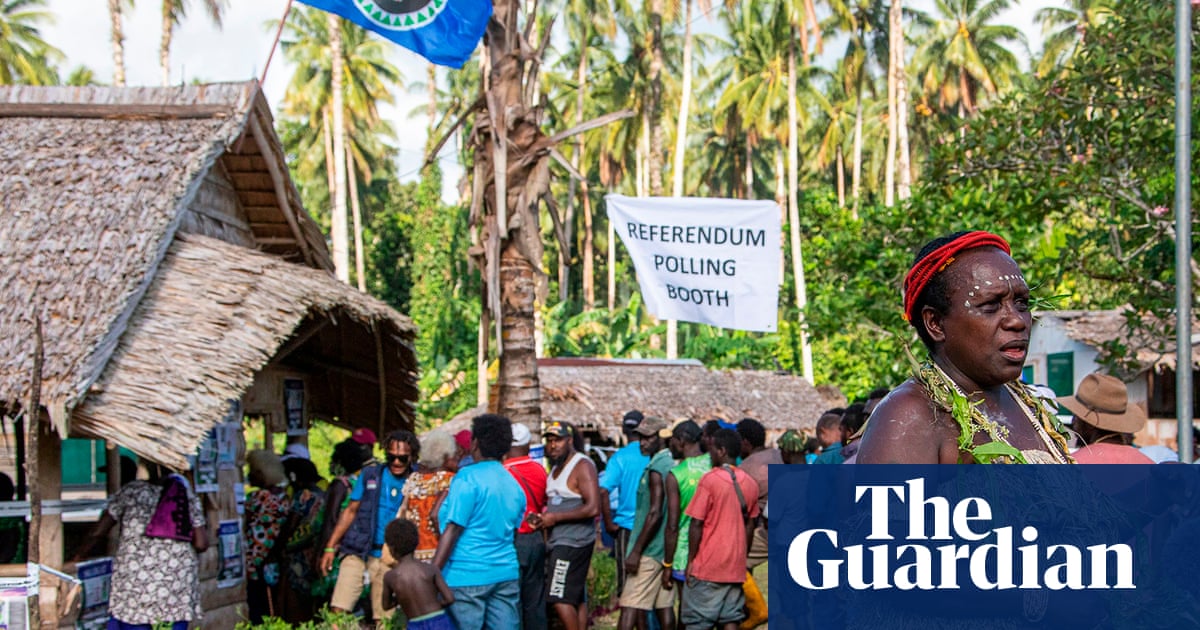
In the coastal town of Buka a solemn procession of people makes its way from the Catholic church to Bel Isi park, where worshippers kneel before a makeshift cross. There is one subject that dominates the prayers in Bougainville today.
We are gathered here this morning in Bel Isi Park to ask you to bless the referendum. May it be peaceful and successful, says the priest.
Besides those at the ceremony, the town is almost deserted. A handful of taxi boats float next to the closed market. The vessels have brought families dressed in their Sunday best for church from other parts of Buka island, some 700km off the coast of Papua New Guinea.
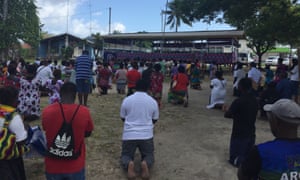
Bernadine Perekai from Haku crossed the Buka Channel with her two sons to attend the mass. In Bougainville, all our hope is in God. She says. We believe he created our land and us, so our lives and our future are in his hands.
The quiet streets and sombre procession are a stark contrast to
Cars beeped their horns in the streets, as crowds singing, dancing, cheering and playing pan flutes followed the regions president John Momis, to the polling booth to watch him as he cast the first vote in the referendum.
Im very happy that my dream to empower people in a way that is democratically appropriate has been achieved, said Momis, emerging from the polling booth with arms raised. Its obvious that the people are now in the mood for celebration and I join them as they have every right to celebrate.
This vote has been 20 years in the making, promised to the people of Bougainville as part of a peace deal reached in 2001, which marked the end of a brutal decade-long civil war that saw an estimated 20,000 out of the regions 200,000 people killed.
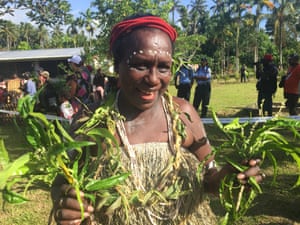
Over the course of two weeks beginning last Saturday more than 206,000 Bougainvilleans, living in the region, on mainland PNG, in Australia and the Solomon Islands, will have their chance to vote to decide whether they wish Bougainville to remain within PNG but with greater autonomy or whether the voters will mark box two and opt to create an independent state. The result will be declared in mid-December and is expected to be overwhelming in favour of independence.
I thank God for what is happening, said Francesca Semoso, womens representative and deputy speaker of the Autonomous Bougainville Government House of Representatives after voting. We have not slept, but did we think this day would come? We are doing this for our daughters and granddaughters.
Margaret Kila, from Malasang, spoke through tears about how significant it was for her to vote in this election.
Ive suffered with my people. Seen a lot of injustice done, during the crisis I am 65 years old and Ive seen everything. And this has made me so happy. Thank you God, she said.
The effort required to conduct a vote like this in Bougainville has been tremendous, says Mauricio Claudio, the chief referendum officer of the Bougainville Referendum Commission (BRC), which has been set up to administer the vote.
Roughly 90% of people in Bougainville live in rural hamlets and villages. Communication is a challenge; there is no radio or television network that covers the entire population and just a few hundred copies of Papua New Guinean newspapers are brought from the mainland each day.
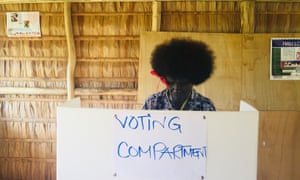
On top of this roughy half of the population are illiterate. In order to spread information to people about the vote and the political process that will follow, not-for-profits have travelled through the islands conducting dialogues and putting on awareness-raising events.
One of these events is being held in Arawa in the days before voting opened. Arawa, one of the major townships in the region, was once the civic headquarters of Bougainville Copper Limited, which managed the Panguna mine, disputes about which sparked the crisis that led to the civil war.
Once, Pangunas gold and copper provided 45% of Papua New Guineas export income. But it has now lain dormant for 30 years as limited remnants of infrastructure, built by the mining company, stand forgotten and idle, with vegetation growing around it.
In the middle of Arawa town, a youth group from Rorovana stages a play for locals on what the voting process will be, even down to the detail of what a voting booth looks like.
There is an issue with managing expectations, especially the belief that if the vote returns a strong result for independence, as expected, Bougainville will immediately become independent.
In reality, the result of the referendum is non-binding, and ultimately the PNG parliament has to vote on whether to allow Bougainville its independence, something that could take up to a decade, according to some experts.
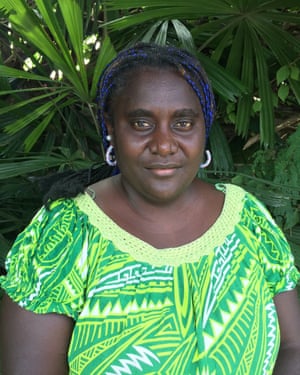
Bougainvillean filmmaker, Llane Munau said that when she spoke to many women in villages about the referendum they would respond Em husait? (Who is that?).
So, Munau created a film called Referendum, Em Husait, which explained the referendum and its importance to them.
The approach is very grassroots. We have people celebrating in the streets because they think that this is it. But were not independent yet. Our people need to understand this, she says.
For now, the people of Bougainville feel optimistic. Travelling through the region, support for independence is evident. Buildings, vehicles and boats are draped with the cobalt blue, Bougainville flag. People sing songs of a safe and fair referendum and, in case they forget, small boards are placed on roadsides with the number two painted on them, to remind them to choose a vote for independence.
Original Article : HERE ;
from MetNews https://metnews.pw/bless-this-referendum-bougainville-votes-and-prays-for-independence/
No comments:
Post a Comment